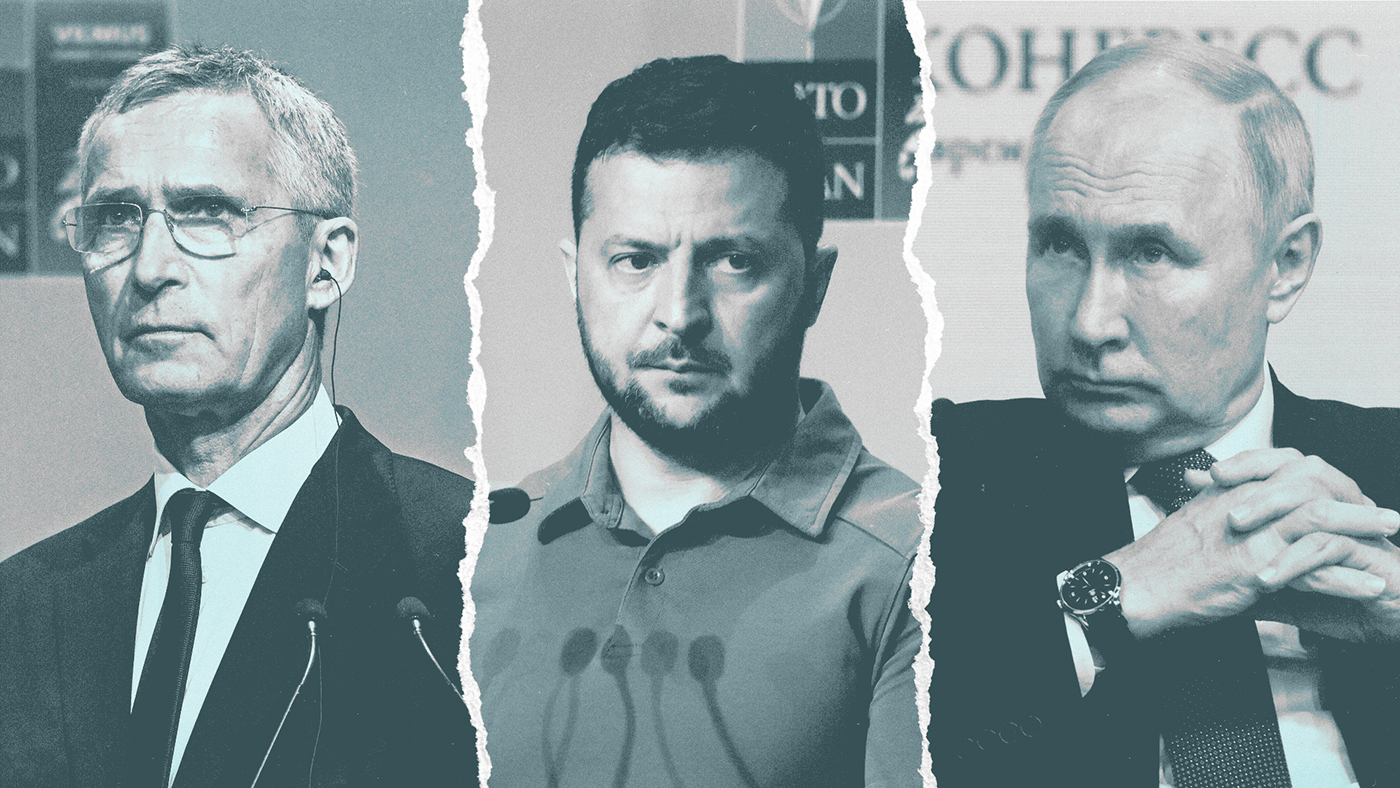Will Nato use Ukraine membership as a bargaining chip with Russia?
Nato may simply be dangling Ukrainian accession plans to bring Russia to the negotiating table, analysts say

A free daily email with the biggest news stories of the day – and the best features from TheWeek.com
You are now subscribed
Your newsletter sign-up was successful
A rift has emerged between Nato and Ukraine as Volodymyr Zelenskyy labelled the alliance’s failure to provide an unambiguous pathway for the country to join Nato “unprecedented and absurd”.
Convening this week in Vilnius, Nato leaders indicated that Ukraine’s future is within the alliance, but with the heavy caveats that the country will join only “when allies agree” and “conditions are met”.
“In other words,” said The Daily Telegraph, “it could be today, tomorrow, or 100 years down the line.”
The Week
Escape your echo chamber. Get the facts behind the news, plus analysis from multiple perspectives.

Sign up for The Week's Free Newsletters
From our morning news briefing to a weekly Good News Newsletter, get the best of The Week delivered directly to your inbox.
From our morning news briefing to a weekly Good News Newsletter, get the best of The Week delivered directly to your inbox.
Yet even the discussions about potentially admitting Ukraine into the alliance have some analysts speculating that Nato is actually using the prospect of the country’s membership as a bargaining chip with Russia.
What did the papers say?
Nato’s failure to offer a clear pathway for Kyiv to become a member nation left Zelenskyy “mad as hell”, said Politico, leading to what the Telegraph called his “decidedly undiplomatic Twitter rant”.
The president appears to have been enraged by the wording of a joint statement being prepared at the meeting in Vilnius, details of which were seen by Politico’s National Security Daily ahead of its official release.
Prior to the gathering in Lithuania, Joe Biden had already said it would be “premature” for Ukraine to begin the Nato membership process during a war. Politico added: “Ukraine is still defending itself against Russian invaders and Nato membership would mean the alliance would have to get directly involved”.
A free daily email with the biggest news stories of the day – and the best features from TheWeek.com
This left Zelenskyy “mad as hell”, declaring the lack of certainty “weak”, the site said.
On Twitter, the Ukrainian leader wrote: “It’s unprecedented and absurd when [a] time frame is not set neither for the invitation nor for Ukraine’s membership. While at the same time vague wording about ‘conditions’ is added even for inviting Ukraine.”
Despite the criticisms, Nato leaders have “every reason to toast their success,” said analysts Grey Anderson and Thomas Meaney in The New York Times.
Only four years ago, French president Emmanuel Macron said the alliance was undergoing “brain death”. But with Sweden and Finland being rapidly accepted into Nato’s ranks and European military expenditure on the rise, the alliance is enjoying a surge in positive public opinion.
If Russia had sought to divide Europe, President Biden “could plausibly declare last spring that it had instead fully ‘Nato-ised’ the continent”, Anderson and Meaney wrote.
Yet Zelenskyy could be “forgiven for thinking” that Nato is not serious about admitting Ukraine as a member, but is rather using Ukraine’s membership bid as a bargaining tool with Russia, said the Telegraph.
In May, Macron’s unexpected switch to backing the British and Polish calls for swift Ukrainian accession, was “hailed as a major shift”, the paper said.
But according to Le Monde, the move was merely “tactical” and “a means of influencing the conflict and bringing Moscow and Kyiv to the negotiating table”.
What next?
Ukraine is “undoubtedly the summit’s focus”, said the South China Morning Post. “But what Kyiv values more than weapons is its admission into Nato”. Yet this remains little more than an “uncertain prospect despite pressure from President Volodymyr Zelenskyy”.
Even the suggestion that Ukraine will gain membership once the war is over could be “encouraging Putin to keep fighting”, said the Carnegie Institute’s Judy Dempsey. Consequently, “Nato leaders should be more courageous”.
“At a minimum, Nato should vastly increase the amount of weapons and ammunition it supplies,” Dempsey argued. “Better still… would be genuine defence guarantees, of the kind the United States offers Japan and South Korea”, she added, along with “Western forces stationed on Ukrainian soil, backed up by (at least) the UK and French nuclear deterrents”.
Following Zelenskyy’s criticisms, Nato secretary-general Jens Stoltenberg defended the alliance’s position, calling it “a strong package for Ukraine”, that ultimately offers “a clear path towards its membership in Nato”.
The Ukrainian leader will now have a meeting with Biden which, according to Politico, “now takes on a more hostile tone following Zelenskyy’s public denouncement”.
Arion McNicoll is a freelance writer at The Week Digital and was previously the UK website’s editor. He has also held senior editorial roles at CNN, The Times and The Sunday Times. Along with his writing work, he co-hosts “Today in History with The Retrospectors”, Rethink Audio’s flagship daily podcast, and is a regular panellist (and occasional stand-in host) on “The Week Unwrapped”. He is also a judge for The Publisher Podcast Awards.